Will, Walter J. born 19-03-1922 in Pittsburgh, Pennsylvania,  United States, to John Adam Will (1877–1955) and his wife Theresa A.born Lorunz Will (1884–1974).
United States, to John Adam Will (1877–1955) and his wife Theresa A.born Lorunz Will (1884–1974). 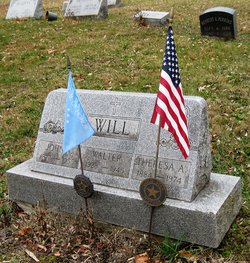 Walter had two sisters and four brothers, George Adam Will,(1901–1982), Frederick K Will (1912–1983), Robert J Will (1915–1996), Lillian Tresea Will Clarke (1918–2006), Albert Karl Will
Walter had two sisters and four brothers, George Adam Will,(1901–1982), Frederick K Will (1912–1983), Robert J Will (1915–1996), Lillian Tresea Will Clarke (1918–2006), Albert Karl Will
(1920–1976) and Alma Will Reader (1927–2023).
Will joined the Army from West Winfield, New York in December 1940 and by 30-03-1945 was serving as a first lieutenant in Company K, 18th Infantry Regiment, (“Vanguards”)  under command of George A. Smith, Jr.
under command of George A. Smith, Jr. 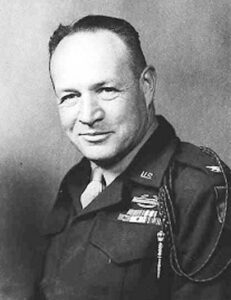
 of the 1st Infantry Division. “The Big Red One”
of the 1st Infantry Division. “The Big Red One”  under command of Major General Clarence Ralph. Huebner
under command of Major General Clarence Ralph. Huebner

 The casualities of the 1st Infantry Division. “The Big Red One” during their European campaign, : Total battle casualties: 20,659 (15,374 in Europe, 5,285 in North Africa and Sicily), Killed in action: 3,616 (2,713 in Europe, 903 in North Africa and Sicily), Wounded in action: 15,208 (11,527 in Europe, 3,681 in North Africa and Sicily), Missing in action: 499 (329 in Europe, 170 in North Africa and Sicily), Prisoner of war: 1,336 (805 in Europe, 531 in North Africa and Sicily) nad Days of Combat: 443 (292 in Europe, 151 in North Africa and Sicily).
The casualities of the 1st Infantry Division. “The Big Red One” during their European campaign, : Total battle casualties: 20,659 (15,374 in Europe, 5,285 in North Africa and Sicily), Killed in action: 3,616 (2,713 in Europe, 903 in North Africa and Sicily), Wounded in action: 15,208 (11,527 in Europe, 3,681 in North Africa and Sicily), Missing in action: 499 (329 in Europe, 170 in North Africa and Sicily), Prisoner of war: 1,336 (805 in Europe, 531 in North Africa and Sicily) nad Days of Combat: 443 (292 in Europe, 151 in North Africa and Sicily).
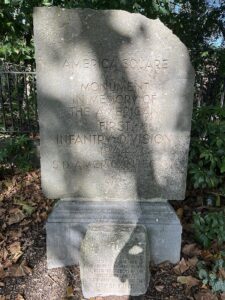 Stone commemorating the liberation of Eupen, Belgium by the 1st Infantry Division. Medal of Honor: 17, DSC: 131, Legion of Merit: 16, Silver Star: 4,258, Soldiers Medal: 100, Bronze Star: 12,568, Air Medal: 65, Prisoners taken: 188,382 and Days of Combat: 443.
Stone commemorating the liberation of Eupen, Belgium by the 1st Infantry Division. Medal of Honor: 17, DSC: 131, Legion of Merit: 16, Silver Star: 4,258, Soldiers Medal: 100, Bronze Star: 12,568, Air Medal: 65, Prisoners taken: 188,382 and Days of Combat: 443.
Death and burial ground of Will, Walter J.
 During a firefight on that day near Eisern, Germany,
During a firefight on that day near Eisern, Germany, 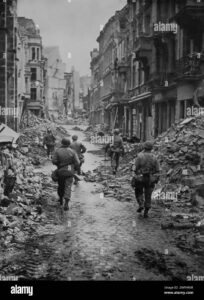 he rescued three wounded men, single-handedly disabled two German machine gun nests and led his squad in the capture of two others, all despite his injuries. Mortally wounded while leading a charge on the enemy, Will was awarded the Medal of Honor
he rescued three wounded men, single-handedly disabled two German machine gun nests and led his squad in the capture of two others, all despite his injuries. Mortally wounded while leading a charge on the enemy, Will was awarded the Medal of Honor  posthumously seven months later, on 17-10-1945.
posthumously seven months later, on 17-10-1945.
First Lieutenant Will’s official Medal of Honor citation reads:
He displayed conspicuous gallantry during an attack on powerful enemy positions. He courageously exposed himself to withering hostile fire to rescue 2 wounded men and then, although painfully wounded himself, made a third trip to carry another soldier to safety from an open area. Ignoring the profuse bleeding of his wound, ![]() he gallantly led men of his platoon forward until they were pinned down by murderous flanking fire from 2 enemy machine guns. He fearlessly crawled alone to within 30 feet of the first enemy position, killed the crew of 4 and silenced the gun with accurate grenade fire. He continued to crawl through intense enemy fire to within 20 feet of the second position where he leaped to his feet, made a lone, ferocious charge and captured the gun and its 9-man crew. Observing another platoon pinned down by 2 more German machine guns, he led a squad on a flanking approach and, rising to his knees in the face of direct fire, coolly and deliberately lobbed 3 grenades at the Germans, silencing 1 gun and killing its crew. With tenacious aggressiveness, he ran toward the other gun and knocked it out with grenade fire. He then returned to his platoon and led it in a fierce, inspired charge, forcing the enemy to fall back in confusion. 1st Lieutenant Will was mortally wounded in this last action, but his heroic leadership, indomitable courage, and unflinching devotion to duty live on as a perpetual inspiration to all those who witnessed his deeds.
he gallantly led men of his platoon forward until they were pinned down by murderous flanking fire from 2 enemy machine guns. He fearlessly crawled alone to within 30 feet of the first enemy position, killed the crew of 4 and silenced the gun with accurate grenade fire. He continued to crawl through intense enemy fire to within 20 feet of the second position where he leaped to his feet, made a lone, ferocious charge and captured the gun and its 9-man crew. Observing another platoon pinned down by 2 more German machine guns, he led a squad on a flanking approach and, rising to his knees in the face of direct fire, coolly and deliberately lobbed 3 grenades at the Germans, silencing 1 gun and killing its crew. With tenacious aggressiveness, he ran toward the other gun and knocked it out with grenade fire. He then returned to his platoon and led it in a fierce, inspired charge, forcing the enemy to fall back in confusion. 1st Lieutenant Will was mortally wounded in this last action, but his heroic leadership, indomitable courage, and unflinching devotion to duty live on as a perpetual inspiration to all those who witnessed his deeds.
In April 1944, the U.S. Army took delivery of the “freight and supply” ship U.S. Army Lieutenant Walter J. Will (FS-244), which was named for Will. In November 1948, the Army transferred her to the fleet of the United States Department of the Interior’s Fish and Wildlife Service,  in which she served as MV Dennis Winn
in which she served as MV Dennis Winn 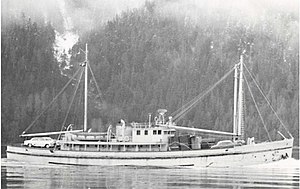
Will, Walter J. fell 30-03-1945, age 23, in Eisern, mortally wounded while leading a charge on the enemy, Germany. Walter is buried at the Netherlands American Cemetery in Margraten, South Limburg, the Netherlands.
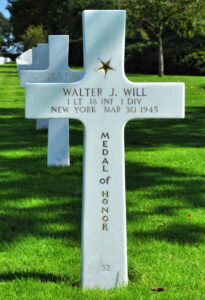

















Leave a Reply